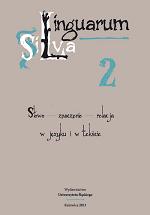„Złapać bakcyla”, czyli o ewolucji znaczeń niektórych wyrazów z leksyki medycznej i potocznej
“Catch a Bug”, or on the evolution of meanings of some words from medical and colloquial lexis
Author(s): Barbara PukalskaSubject(s): Language and Literature Studies
Published by: Wydawnictwo Uniwersytetu Śląskiego
Summary/Abstract: The article is devoted to selected lexemes functioning both in medical and colloquial lexis. They are divided into three categories. The first one contains the names of serious and dangerous diseases such as gangrena (gangrene) and cholera (cholera). The second includes the names of disorders of speech and sight organs functioning, that is niemota (muteness), ślepota (blindness), dalekowzroczność (long-sightedness) and krótkowzroczność (short-sightedness) while the third one covers the names of diseases related to mental functioning disorders and names of people suffering from them such as kretynizm (cretinism), kretyn (cretin), debilizm (moronism), debil (moron), imbecyl (imbecil), idiotyzm (idiotism), idiota (idiot), mania (mania), maniak (maniac). The article makes an attempt at presenting and comparing a medical and colloquial meaning of these lexemes. The analysis shows among others that as the medical meanings of the words in question refer to both the functioning of the body and the mind the colloquial ones refer most often to the sphere of psyche, intellect and morality. The article also pays attention to the emotional marking of these lexemes in a colloquial meaning, and permeation of words from medical terminology into the colloquial language (and the other way round).
Journal: Linguarum Silva
- Issue Year: 2013
- Issue No: 2
- Page Range: 71-90
- Page Count: 20
- Language: Polish

